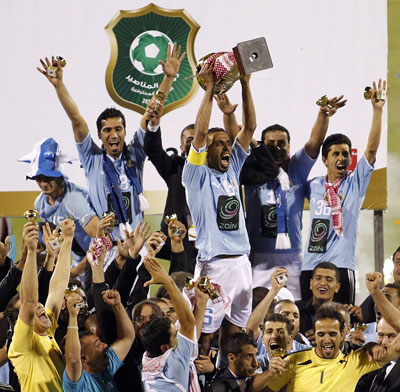AMMAN — Raed Nsour used to sell his house furniture to cover the cost of travelling to watch his favourite football club Faisali whenever they played abroad.
Faisali-addicted Nsour said he used to have “big arguments” with his boss every time he took days off to watch the club’s matches at a local stadium.
But the excitement of watching Faisali matches has been fading lately as Jordan’s oldest football club are struggling not only to win matches, but also to score goals.
“For the past 25 years, I did not miss watching a single match the team played in both Jordan and abroad. But I decided to stop doing so since last year,” Nsour told The Jordan Times over the phone.
The team’s negative results this season drove many fans to stage a demonstration outside Parliament earlier this month, calling for the resignation of the football club’s administration.
Deputy Motaz Abu Rumman, a member of the Lower House Transparency and Integrity Committee, asked the head of the committee to refer the club’s case to the panel after the team’s general assembly members’ complained about the administration’s financial irregularities, according to a statement sent to The Jordan Times.
Nsour said businessmen and senior officials used to attend the team’s matches in the past.
Today, a limited number of fans go to the stadium to watch the team play.
In this year’s professional league, the team is in eighth place, having won three matches, lost four and tied in four others.
Several football experts and the team’s former players described the stage the team reached this year as “disastrous”.
Amjad Majali, the head of sports department at Al Rai Arabic daily, attributed this year’s negative results to the instability the club are going through.
“In the past, the stability in management was reflected positively in the team’s great performance,” Majali told The Jordan Times, also citing frequent change in coaches as an instability factor.
“One coach used to be in charge of the team for 15 years, while in the past three years the team have changed several coaches,” he noted.
Financial difficulties facing Faisali prompted several players to move to the team’s rivals, which also resulted in a sharp decline in performance.
Taiseer Omeiri, head of the sports section at Al Ghad daily, said the management of some clubs turn them into “groceries”.
“Faisali are the main example of being a private company. The shocking thing is that the number of the team’s general assembly members does not exceed 200 people,” he added.
Omeiri said the team have been facing great financial burdens because they have not clinched any major title for a long time.
For the first time in the history of Jordanian football, the national team does not include any player from Faisali, which is “extremely shocking”, he said.
The club have also been ignoring the grass roots, which used to be one of the major reasons behind their success, according to former Faisali coach Mathahar Saeed.
“When I was in charge of the team, I was carefully looking for young players who could serve me for a long time. That was the main reason behind the team’s success,” noted Saeed, who coached Faisali for more than 13 years, winning 19 local trophies.
Former international footballer Jamal Abu Abed, who joined the team at the age of 16 more than three decades ago, said they are unable to meet the requirements of the professional league.
Since 2009, the league has had 12 teams compared to four when it first kicked off in 1944 with Faisali, Ahli, Urdun and Homenetmen competing.
Since the 2008 season, the competition has been renamed the “Jordan Professional League”.
Since that season, Faisali only managed to win the title twice, although the team have won a record 32 times and were crowned as winners of the Jordan Cup 17 times.
“Since the league turned professional, the team have only had short-term contracts with players, which is not beneficial. Also, sometimes we see that the team lose around six players and bring in another six to replace them, which has had a negative effect on the club’s stability,” added Abu Abed, who played with Faisali for 20 years.
He recalled that “back in his day”, players were loyal to their clubs.
“Now, they are looking for money,” he noted.
Jeryes Tadrous, the club’s and the national team’s former top goal scorer, said he does not blame the team’s footballers because they need the money.
“The management is responsible for the hardships the team are facing. They have to deal with the financial difficulties the club are facing,” Tadrous added.
Al Rai’s Majali said the management has to be open to Faisali fans and let them be part of the team’s general assembly.
“They have to provide the team’s supporters with a suitable environment to make it feasible for them to support the club financially. If elections are held, they need to open it to everyone, not just members of the [Odwan] family,” he added.
Sultan Odwan has been president of the club for almost 20 years.
Omeiri said the Higher Council for Youth also has to look into the case and assess the number of general assembly members.
The administration’s response to the protests and criticisms has been limited to issuing a statement recently warning the fans of “unknown parties” that seek to disrupt the club’s stability.
“There are forces that want evil to befall this national institution... Faisali are a tribe,” the statement said, adding that “tribal ethics” do not allow for members of the same tribe to oppose each other, conspire against one another or attack “our elders”.
“We are well aware that forces are working ‘under the table’ to tear this tribe apart and turn the club into a free-for-all,” the administration said, pledging to the fans that the club will reclaim their days of glory and that the current crisis will be overcome.
